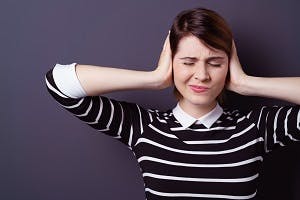Tinnitus is one of the most common hearing ailments, experienced by up to 50 million Americans.
Because May is Better Hearing Month, it is the perfect time to learn more about this symptom often referred to as “ringing in the ears” – even though it can also sound like buzzing, clicking or hissing. Tinnitus is not a disease, but rather a sign of an issue with the auditory system.
Types of Tinnitus
- Subjective: The most common type, subjective tinnitus is most often due to exposure to loud noise. It may come and go suddenly or last for months at a time. It may never go away in more severe cases.
- Objective: The rarest form of tinnitus, this form can actually be heard by other people. May be caused by muscle contractions or problems with the vascular system. If the cause is treated, objective tinnitus can usually be fixed permanently.
- Neurological: Often caused by a disorder such as Meniere’s disease that disturbs the brain’s auditory processes.
- Somatic: Caused, worsened or related to the sensory system.
Causes
A number of factors may be responsible for your tinnitus. Here are some of the most common causes:
- Noise-induced hearing loss: May stem from noisy work environments, loud music or for service members, explosion blasts.
- Hearing loss due to aging: Known as presbycusis, this form of hearing loss tends to show up in both ears, primarily after the age of 60. Often involves the loss of high-frequency sounds.
- Ear canal blockages: Ear wax or head congestion may be to blame for noise in your head or ears.
- Prescription drugs: Usually a temporary side effect, but can be more permanent for medications such as Non-Steroidal Anti-Inflammatory Drugs (NSAIDS), water pills, and certain cancer medications and antibiotics.
Hearing Aids Can Help
While hearing aids are not a cure for tinnitus, the sounds they can help you hear may make the internal sounds seem less noticeable. The hearing instruments will allow your brain to receive the stimulation of frequencies you had not been hearing. This process helps “cover up” the effect of tinnitus.
Certain specialized hearing aids attempt to provide additional relief from tinnitus by providing white noise stimulation or blend the ringing into the background, making it less disruptive. Ask your Hearing Associates audiologist about selecting the right type of hearing aid for you.
For more information on tinnitus and hearing services available at Hearing Associates, contact us at 888.760.2032 or request an appointment.


